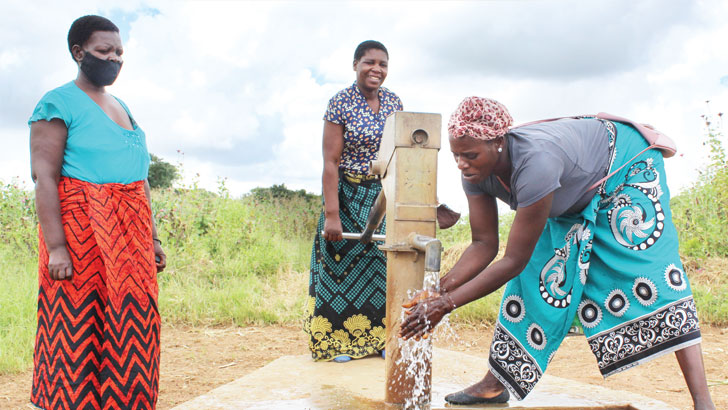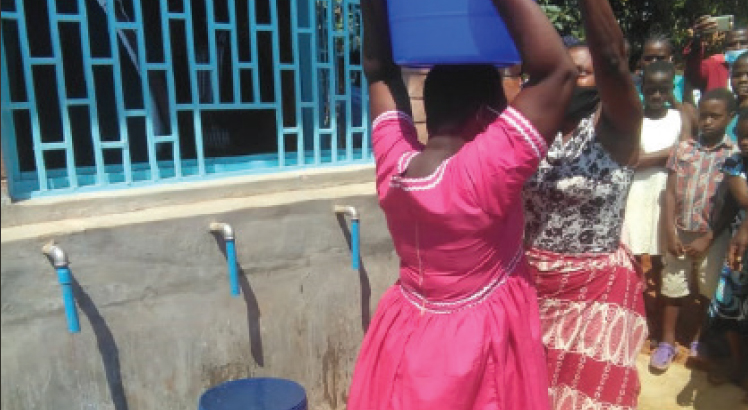26% of boreholes fail pumping test
A recent study has revealed that as of May this year, 26 percent of boreholes in 21 districts have failed the pumping test.
That is 102 out of 388 boreholes in the surveyed districts, meaning that millions are unable to access safe drinking water, according to water management firm Base Flow.

The firm has since warned that the country risks repeating the water access paradox experienced in 2015 when Malawi achieved an impressive 89 percent water coverage aligned with Sustainable Development Goals (SDGs), yet 22 percent of the water points were non-functional.
Base Flow team leader Muthi Nhlema, in an interview this week, pointed out that the 89 percent coverage did not account for at least 22 percent non-functionality rate of water points at the time, which in essence meant that the country’s water coverage rate was around 67 percent.
Said Nhlema: “Even if we accelerate efforts between now and 2030, to ensure universal access to safe drinking water, the reality is that people will gain access to water points, but the quality of service will suffer.”
According to him, the yield from the water points falls short of the minimum standards set in the country’s national guidelines, adding that celebrating access alone won’t suffice, rather the country must address service quality.
He said: “In 2015, most of the population had access to water points, but a quarter of them were non-functional. Fast-forward to 2030, and we face a similar paradox, widespread access, yet compromised service due to low yield.”
Nhlema highlighted that the current 26 percent failure rate in pumping tests exacerbates the situation, saying if this trend is applied nationally, it could reveal an additional challenge of water points failing to meet the minimum yield standards among the people with access to potable water.
According to him, there is a time cost to the failure rate as people wait for groundwater to recharge at a borehole or walk long distances searching for water, saying the country is losing man-hours that could have been used productively.
Commenting on the issue, Water and Environmental Sanitation Network executive director Willie Mwandira said the development means Malawi’s attainment of SDG 6 by 2030 is unlikely.
He emphasised that some drillers may be compromising quality by delivering sub-standard infrastructure.
He argued that the certification process before handing over water points lacks thoroughness, necessitating stricter checks, including borehole yield tests, before contractors transfer the vital resources to beneficiaries.
Mwandira said: “Safe drinking water plays a catalytic role in any nation’s development.”
Health rights activist Maziko Matemba said in an interview that the findings serve as a reminder to the government that more work is urgently required for the country to attain SDG 6 by 2030.
He stressed that the study should also serve as a benchmark for rectifying the failures in water quality and management.
Matemba said: “Our observations indicate that the country’s waterborne diseases, such as cholera, stem from issues related to water quality and hygiene. These critical areas demand immediate attention.”
On his part, Malawi Equity Health Network (Mhen) executive director George Jobe highlighted the need to explore alternative options for communities facing water pumping test failures, saying by doing so, the country can effectively prevent waterborne diseases.
In a telephone interview yesterday, Parliamentary Committee on Natural Resources and Climate Change chairperson Werani Chilenga attributed the trends to funding constraints in the sector.
Chilenga also observed that the water table in the country has gone down due to land degradation and that despite having laws such as the Forestry Act, implementation is a challenge.
He asked: “Police are just looking at people carrying charcoal pass roadblocks, how can we win this fight with this kind of behaviour?”
According to statistics from Ministry of Water and Sanitation, a sample, in 2023, of 223 water quality tests on hand-pumped boreholes, shallow wells, and tap stands in Balaka, Machinga, Lilongwe Rural, Nkhotakota, and Mzimba districts revealed that 18 percent of boreholes fitted with hand pumps showed thermo tolerant coliforms contamination in the dry season and 21percent in the rainy season.
The data further show that water quality tests conducted in Machinga and Zomba districts for Water Users Association-managed piped water supply facilities have previously found E.coli present in 39 of 80 (49 percent) tests.
A 2013 study by the World Bank shows that for every $1 invested in climate-resilient water and sanitation, there is a return of at least $7 for African economies.
The study also shows that sub-Saharan Africa countries such as Malawi alone could gain more than 5 percent of its GDP, equivalent to $200 billion annually, if sufficient investment in water and sanitation are made.





